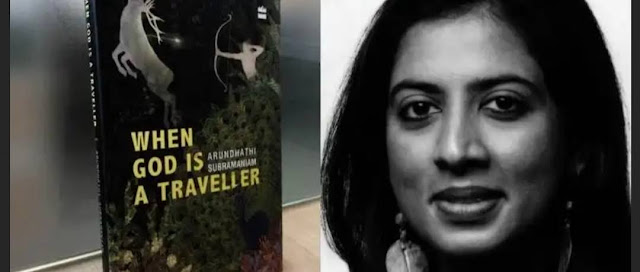When God is a Traveller by Arundhathi Subramaniam
Hello friends!
Today I am going to share my view on this poem. This is Sunday reading task which is given by Dr Dilip Barad sir. So let us see this poem's interpretation.
‘One of the finest poets writing in India today … It is not dulcet music you hear in Where I Live. It’s the swish of swordplay, each poem skewered at sabre-point and then placed on an electric grille to sizzle like a rasher on a barbecue.’ —Keki Daruwalla, The Hindu
*When God Is a Traveller*
-Arundhati Subramaniam
About the Author:
Arundhathi Subramaniam is a poet and writer and on spirituality and culture. She has worked over the years as poetry editor, curator, and journalist on literature, classical dance and theatre. She divides her time between Bombay and a yoga centre in Coimbatore.
Arundhathi Subramaniam is the author of three books of poems: most recently Where I Live: New & Selected Poems Bloodaxe Books, UK. Her prose works include the bestselling biography of a contemporary mystic Sadhguru: More Than a Life, Penguin and a book on the Buddha (Book of Buddha), Penguin Books (reprinted several times). As editor, she has worked on a Penguin anthology of essays on sacred journeys in the country (Pilgrim’s India), and co-edited a Penguin anthology of contemporary Indian love poems in English (Confronting Love).
Works:
1. Eating God: A Book of Bhakti Poetry 2014
2. Where I Live: New and Selected Poems 2009
3. Love Without a Story 2019
4. The Book of Buddha 2006
5. Sadhguru, More Than a Life 2010
Poem:
Wondering about Kartikeya/ Muruga/ Subramania, my namesake)
Trust the god back from his travels, his voice wholegrain (and chamomile),
his wisdom neem, his peacock, sweaty-plumed, drowsing in the shadows.
Trust him who sits wordless on park benches listening to the cries of children fading into the dusk,
his gaze emptied of vagrancy, his heart of ownership.
Trust him who has seen enough— revolutions, promises, the desperate light of shopping malls, hospital rooms, manifestos, theologies, the iron taste of blood, the great craters in the middle of love.
Trust him who no longer begrudges his brother his prize, his parents their partisanship.
Trust him whose race is run, whose journey remains, who stands fluid-stemmed knowing he is the tree that bears fruit, festive with sun.
Trust him who recognizes you— auspicious, abundant, battle-scarred, alive— and knows from where you come.
Trust the god ready to circle the world all over again this time for no reason at all other than to see it through your eyes.
In 'When God is a Traveller', Subramaniam weaves metaphors, metaphors that are distinctively hers, into language that is simultaneously fluid and simple. Everydayness is woven as a metaphor rife with allusions to the deeper meanings of life. At first glance, the poems from this collection come across as beautiful but not too good. But there is a vulnerability, an intimacy in this text which so exquisitely and slyly draws you in like a comfortable Ikat kurta until you are “drowning in verse”.
Many readings of this award-winning text exist but they highlight the religious aspect of the text. While it undoubtedly adheres to a certain religious context, it differs widely in terms of the figures of the Hindu pantheon represented, that is, the ones within the text are not really the most popular of the Hindu gods. Moreover, what Subramaniam does is that she uses these figures but challenges the canonical religious stories through her representations, as can be observed in the poem ‘Benaras’, an underappreciated piece in my opinion. She tries to highlight the personal side of one’s religious beliefs, for instance in the poem ‘How Some Hindus Find Their Personal Gods’.
Finally, what especially stands out in Subramaniam’s poetry collection is the imagery. Even when the meaning of the poems eludes the reader, the meaning-making processes remain accessible through the vivid images constructed, which interact with each other to produce meaning. In this text, the meaning is created through the words as well as through the imagery. This gives it a subliminal quality of sorts.
All in all, a delightful read. The allusions of Hinduism do leave scope for criticism. However, I think the Hinduism in the text alludes to the Bhakti tradition, a countercultural movement to the canonical tradition. But oh, the words, the language, the imagery- they entrapped me, an unsuspecting reader and I have zero regrets.
Thank you...



Comments
Post a Comment